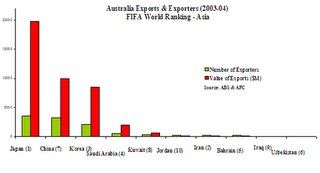
Australia beat Uruguay in a dramatic penalty shoot-out to qualify for next year's World Cup in Germany, their first finals appearance since 1974. The "Socceroos" become a member of the Asian Football Confederation from 1 January 2006 and with their qualification alongside Saudi Arabia, Japan, Korea Republic and Iran, the number of Asian countries in the World Cup has risen to five. Bahrain missed out on a sixth place for Asia when it lost 2-1 on aggregate to Trinidad and Tobago in the AFC/CONCACAF playoff.
Asia currently has 4½ spots in the 32-team World Cup but the AFC wants at least one and possibly two more in time for the 2010 World Cup in South Africa. "We are hoping for this very much," AFC general secretary Peter Velappan said recently.
Uruguay, World Cup champions in 1930 and 1950, won Saturday's first leg of the playoff between Oceania and South America in Montevideo 1-0 but the Australians reversed the score in Sydney with a brilliant first half goal from Marco Bresciano. Australia won the shoot-out 4-2 with Spanish-based striker John Aloisi scoring the decisive goal from the spot after the teams finished the two legs 1-1 on aggregate. It was the first time that a penalty shoot-out victory has led directly to a place in the World Cup finals, Reuters reported.
"We thought it was going to happen. We've been dreaming of this for 32 years," said Aloisi. "You couldn't ask for a better finish, with 83,000 people here to watch us and 20 million people in Australia following us. I just can't believe it," added the Alaves forward.
"It is a huge compliment that they were so coachable," said recently appointed Australian coach, Guus Hiddink. "At times, they were complaining that we were working too hard. But I think it was worth it. "
Football success last night means a place in the 9 December World Cup draw in Leipzig, followed next June by at least three group games before a cumulative TV audience of 30 billion people.
But the Australian government also has the idea of leveraging increased trade and investment off the Socceroo's participation in the World Cup and the country's new 'home' in the Asian Football Confederation.
For instance, Business Club Australia, a sports business networking program developed by the Australian Trade Commission for the Sydney Olympics, generated A$1.2 billion in business deals at those games and around A$370 million at the Rugby World Cup held in Australia. BCA is in full gear for the Commonwealth Games in Melbourne in 2006 and is now focusing on the networking spin-offs from football.

"Australia’s trade patterns do reflect its AFC membership," said Austrade's Chief Economist, Tim Harcourt in his latest analysis, Sporting ties kick-start Australian-Asian trade momentum.
"According to Austrade research, the top ranked AFC nations account for around of A$42 billion in exports compared to A$13.6 billion of the top ranked FIFA nations. In essence, by gaining admission into the AFC, John O’Neill and his team at the Football Federation of Australia not only gave soccer fans something to cheer about, but they have also given Australia a long run economic benefit as well in terms of trade."
Asia currently has 4½ spots in the 32-team World Cup but the AFC wants at least one and possibly two more in time for the 2010 World Cup in South Africa. "We are hoping for this very much," AFC general secretary Peter Velappan said recently.
Uruguay, World Cup champions in 1930 and 1950, won Saturday's first leg of the playoff between Oceania and South America in Montevideo 1-0 but the Australians reversed the score in Sydney with a brilliant first half goal from Marco Bresciano. Australia won the shoot-out 4-2 with Spanish-based striker John Aloisi scoring the decisive goal from the spot after the teams finished the two legs 1-1 on aggregate. It was the first time that a penalty shoot-out victory has led directly to a place in the World Cup finals, Reuters reported.
"We thought it was going to happen. We've been dreaming of this for 32 years," said Aloisi. "You couldn't ask for a better finish, with 83,000 people here to watch us and 20 million people in Australia following us. I just can't believe it," added the Alaves forward.
"It is a huge compliment that they were so coachable," said recently appointed Australian coach, Guus Hiddink. "At times, they were complaining that we were working too hard. But I think it was worth it. "
Football success last night means a place in the 9 December World Cup draw in Leipzig, followed next June by at least three group games before a cumulative TV audience of 30 billion people.
But the Australian government also has the idea of leveraging increased trade and investment off the Socceroo's participation in the World Cup and the country's new 'home' in the Asian Football Confederation.
For instance, Business Club Australia, a sports business networking program developed by the Australian Trade Commission for the Sydney Olympics, generated A$1.2 billion in business deals at those games and around A$370 million at the Rugby World Cup held in Australia. BCA is in full gear for the Commonwealth Games in Melbourne in 2006 and is now focusing on the networking spin-offs from football.

"Australia’s trade patterns do reflect its AFC membership," said Austrade's Chief Economist, Tim Harcourt in his latest analysis, Sporting ties kick-start Australian-Asian trade momentum.
"According to Austrade research, the top ranked AFC nations account for around of A$42 billion in exports compared to A$13.6 billion of the top ranked FIFA nations. In essence, by gaining admission into the AFC, John O’Neill and his team at the Football Federation of Australia not only gave soccer fans something to cheer about, but they have also given Australia a long run economic benefit as well in terms of trade."
See also: AFC rooting for Australian win against Uruguay (21 Oct)